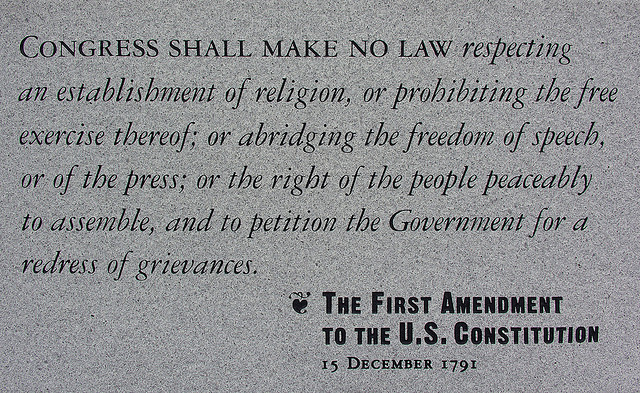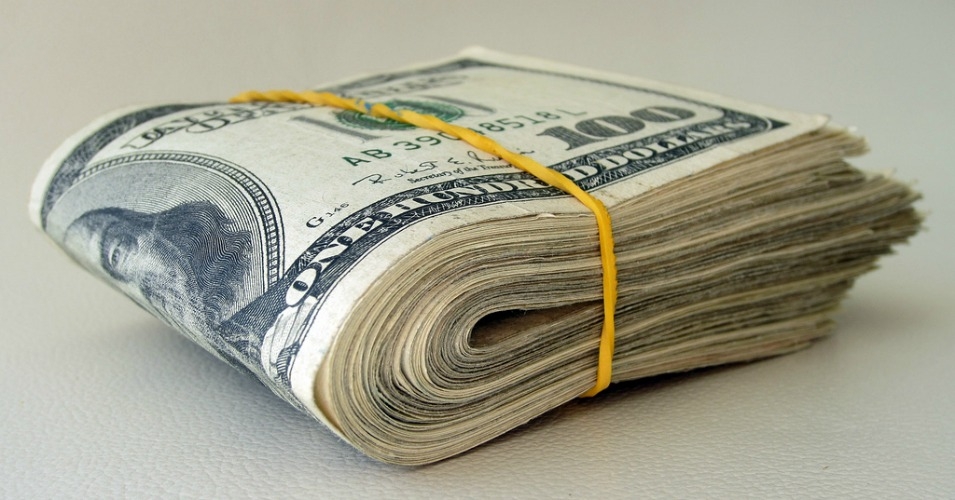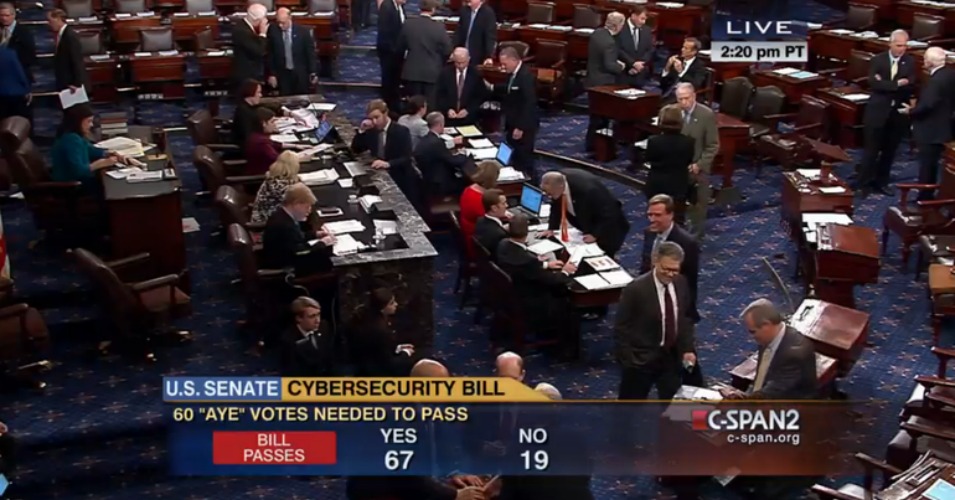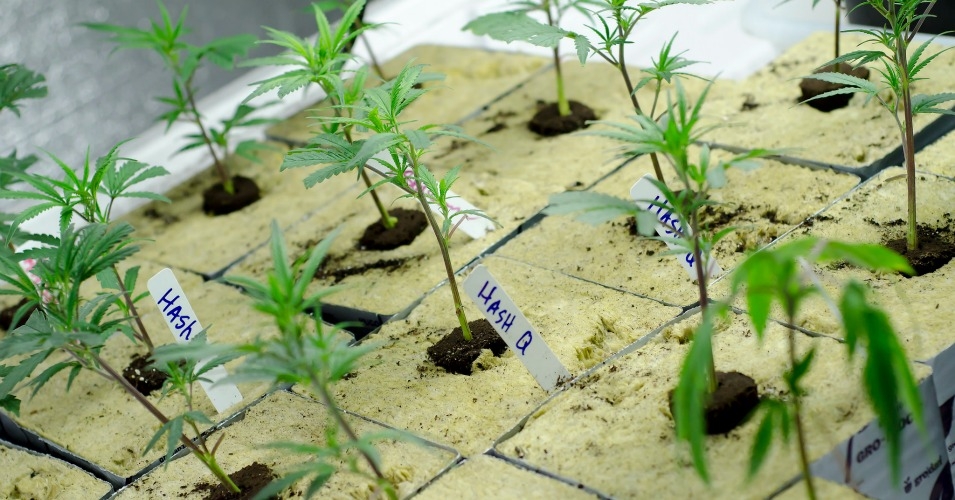Press freedom is only where we should start as activists, not where we should stop
Written by Dan Gillmor. Published 10-26-15 by Open Democracy.

Telegraph newsroom
by antony_mayfield, via flickr
The following is based on the speech given by the author at the Global Editors Network Summit in 2014. Thanks go to the author for allowing us to republish it here.
This happened earlier this year: New York Times investigative reporter James Risen used Twitter to denounce the Obama administration’s attitude toward journalists in general, and national security journalists in particular. Of all recent administrations, he said–accurately, I think—this one has been the “greatest enemy of press freedom in a generation.”
Risen’s tirade set off a brief debate in the community of people who watch and comment on journalism. Some said a reporter shouldn’t be expressing such thoughts publicly, because it might cause readers to question his–and his newspaper’s–commitment to “objective” reporting. But the newspaper’s editor in charge of journalism standards told Margaret Sullivan, the Times’ public editor, that Risen had done the right thing.
“In general,” this editor said, “our reporters understand that they don’t and shouldn’t editorialize on issues we cover….I would put this in a different category.”
This was an important moment in the history of the New York Times. It was officially admitting that it is not neutral, not objective – isn’t pretending to be neutral or objective–on this topic. The Times, as an organization, was taking an activist stance. And of course it should.
So what I’d like to suggest to you today is that all journalists need to think of themselves as activists in the world we now live in, a digital age that has created enormous new challenges to free speech and other liberties. But press freedom is only where we should start, not where we should stop.
Before I go on, let’s define our terms. Journalism can include so many things, ranging from deep investigative work to fluffy entertainment. For our purposes, let’s think of it as helping people understand the world they live in, so that they can make better decisions about how they live. When we do it right, we have to tell truth to the rich and powerful, and uncover things that the rich and powerful would prefer to keep secret. We have to be thorough, accurate, fair, independent and–this is not done enough–transparent. Everyone in this room knows that journalism is vital to liberty, and its cornerstone is free speech.
For activism, I’ll start with the dictionary definition: “the policy or action of using vigorous campaigning to bring about political or social change.” I’d add a corollary–sometimes activism means campaigning to stop certain things from happening.
In many parts of this world, journalists are activists by definition—because truth telling in repressive societies is an act designed to bring about change. I’m humbled by the people who risk their freedom, and sometimes their lives, to tell their fellow citizens and the rest of the world what is happening where they live.
In the western democracies with a more robust tradition of free speech and a free press, the idea of journalists as activists is often seen as taking sides in contravention of journalistic norms. But there’s a long and honorable history of what we call “advocacy journalism”–we could easily call it “activist journalism”–exposing injustices with the absolute goal of stirring public anger, and then public action to bring about change. The muckrakers in the late nineteenth and early twentieth centuries did brilliant journalism of this kind. Today filmmaker Laura Poitras, director of “Citizen Four” about Edward Snowden, is among many others who are carrying on that tradition.
Also today, we have a new category of journalism in the advocacy realm. It’s being done by people who are advocates first, and media producers second. I’m talking, for example, about Human Rights Watch, which consistently does phenomenal reporting on human rights issues around the world.
I’m talking about the American Civil Liberties Union, an organization that consistently does some of the best reporting about threats to our fundamental liberties including free speech. In the interest of transparency, I should mention that my fantastically talented nephew, Daniel Kahn Gillmor, works with the ACLU.
In the past, these organizations and NGOs like them around the world were doing the reporting. Now, in the digital age, every organization of any kind is also a media enterprise, and can go more directly to the public. Collaborations with traditional journalists are still helpful, but no longer as absolutely necessary as they were.
We should welcome the advocates to the journalism ecosystem–and recognize them for their work. By the way, the American Civil Liberties Union probably litigates more open-records cases on issues related to liberty, including free speech, than all traditional news organizations put together.
Now, I’m not saying all advocates are doing journalism–far from it. In many cases we’re getting untrue, unfair propaganda. We need to know the difference, as journalists and as members of the public–that’s another talk entirely.
So we have a baseline of journalistic activism–all around us and often incredibly valuable–on a variety of topics. It makes many traditional journalists uncomfortable. Why? Because we’re told, again and again, that one of journalism’s core values is objectivity and/or neutrality.
But now I’m coming back to my main point. Even journalists who worship at the altar of objectivity should recognize that on some issues, they cannot possibly be objective. Or at least, they should not be. On some issues we have to take stands, even though those stands may put us at policy odds with the people and institutions we cover.
What are these issues? The New York Times has picked one: freedom of the press. I hope no one here would dispute the need to take a stand for press freedom.
Yet this is just one of several policy issues where journalists who do not take activists stands aren’t doing their jobs. These issues come under larger topics at the core of our liberty, among them: freedom of expression, freedom to associate, freedom to collaborate, freedom to innovate.
On those, at least, we should be biased, and open about it.
We need to take these stands because powerful people and institutions, notably governments and corporations, are attacking these core values in the Digital Age. They’re typically doing this in the name of protecting us or giving us more convenience, and there’s some truth in that. But in the process, these powerful entities are creating a host of choke points. They’re locking down more and more of our computing and communications, and creating a system of control over what we say and do.
This is a betrayal of the Internet’s decentralized promise, where speech and innovation and collaboration would often start at the edges of this network of networks, where no one needed permission to do those things. Choke points mean we have to ask permission.
 Choke points
Choke points
What are these choke points? Here are just a few of many.
Start with direct censorship of the Internet, a growing trend in far too many parts of the world. I trust no one here would object to journalistic activism on this front. The New York Times last year did just that by publicly telling China it wouldn’t be intimidated by the regime’s heavy-handed media control.
The Digital Age has become a golden age for something else: surveillance. And wholesale spying on everything that moves has become a method for government—often working with big companies— to keep track of what journalists and activists are doing. This goes way beyond the mission of stopping terrorism and solving major crimes, and it goes to everyone’s liberty, not just journalists’ privilege.
Surveillance has a measurable chilling effect on freedom of expression, and no society that exists under pervasive surveillance can claim to enjoy basic liberty. We know from history that it deadens innovation and culture. Journalists need to actively oppose the surveillance state, if we truly believe in free expression.
Another choke point is the telecommunications industry. In America and many other countries–and often in concert with governments–big telecoms say they should have the right to decide what bits of information get to people’s devices in what order and at what speed, or whether they get there at all. This is what the network neutrality debate is all about in the US: whether we, at the edges of the networks, or the cartel of telecom companies that provide the access to the Internet, get to make those decisions.
Another choke point is what’s called ‘intellectual property’–a useful concept but widely abused. Hollywood and its allies are relentless in their wish to lock down or control innovative technologies that threaten incumbent companies’ business models. They’re abusing the patent and copyright systems, among other tactics. And they never, ever quit. Their latest sneak attack is embedded in a secretly negotiated treaty called the Trans Pacific Partnership. (We know about some of this because Wikileaks has published drafts of several chapters of this immense treaty.)
Speaking of Wikileaks, let’s mention another choke point: the major payment systems like Mastercard, Visa and PayPal. They almost shut down Wikileaks with a funding blackout. Only a few news organizations noticed, much less complained. Yet if you can’t get paid for your work, how do you plan to put food on your table? The centralized payment industry holds enormous power, by proxy, over journalists’ ability to make a living.
Now we’ve helped create some of the choke points—by choosing convenience over liberty in relying on centralized technology and communications platforms like Facebook and Google and Apple and Twitter. I have to note that these companies do provide useful services. And they are often trying to be advocates for free speech, though not consistently.
But do journalists understand that the Internet is getting new editors, namely the people who work for some of those companies? Do journalists understand that by feeding Facebook they are feeding a company that will be their biggest financial competitor? If this was only a business issue I wouldn’t raise it. But it’s much more than that. This is about whether the terms of service at a tiny number of giant companies, as opposed to the First Amendment and other laws like it, will effectively determine our free speech rights.
The corporate online powers are also spying on us. It’s their business model. Journalists are waking up to this, more so in Europe than in the US, but we all need to be thinking harder about how companies can use and abuse big data. We need to help people understand what’s happening, and then campaign for privacy from corporations, not just governments.
Education—of journalists, first, and then audiences—is just the start of what we need to do. More editorials like the Times broadside will help, but news organizations need to reflect a commitment to free speech in their coverage, and beyond.
When it comes to taking action, the revelations of pervasive US government spying have spurred some journalists to pay more attention to security and, in a few cases, deploy countermeasures. (Appallingly, some journalists are kowtowing to government’s growing attacks on basic liberties.)
We need to do much more.
We should hold events to help others learn about countermeasures they, too, can use. And we should overtly lobby—to persuade the public, and Congress, that liberty does carry some risks but is worth preserving.
On network control, news organizations should be shouting from the rooftops about the telecom industry’s power grab. They should be warning the public about what’s at stake. They should be lobbying for federal rules that protect speech and innovation, and at the state level against the telecom giants’ pernicious campaign to bar communities from deploying their own networks.
In all kinds of ways, we should be working to re-decentralize the Internet—both for our own sakes and the public good. The centralized powers won’t be tamed anytime soon, and they’re not all bad by any means. But let’s do what we can to help innovators at the edges of networks, because that’s where free speech starts and ultimately where it is heard.
I’m not asking journalists to ignore nuances in any of this; life and business and policy truly are complicated. But when it comes to things that directly threaten perhaps our the most fundamental liberties—without which journalism is vastly more difficult if not impossible—there’s no excuse for failing to explain what’s at stake. Nor is there any excuse for failing to take a more activist role in preserving liberty.
Core freedoms – of expression, association, and more – should be everyone’s right. Journalists, and journalism educators, have a duty to be their active defenders.
Because unless you prefer a world of choke points and control by others, this is part of our job.
About the author
Dan Gillmor teaches digital media literacy at Arizona State University’s Walter Cronkite School of Journalism and Mass Communication. A writer of books, articles and commentary, Dan speaks widely about tech and media issues, and has been a co-founder, investor and advisor in a number of media-related startups.
This article is published as part of an openDemocracy editorial partnership with the World Forum for Democracy. The insights gathered during the annual Strasbourg World Forum for Democracy inform the work of the Council of Europe and its numerous partners in the field of democracy and democratic governance.
This article is published under a Creative Commons Attribution-NonCommercial 4.0 International licence.
![Photo: Ildar Sagdejev (Specious) (Own work) [CC BY-SA 4.0-3.0-2.5-2.0-1.0], via Wikimedia Commons](http://occupyworldwrites.org/wp-content/uploads/2015/10/2012-03-13_Exxon_with_Shop__Go_in_Durham.jpg)









![Billboard for António Costa, leader of the PS. Photo by El-Kelaa-des-Sraghna (Own work) [CC BY-SA 4.0], via Wikimedia Commons](http://occupyworldwrites.org/wp-content/uploads/2015/10/Cartel_campaña_2015_Portugal_-_PS.jpg)

